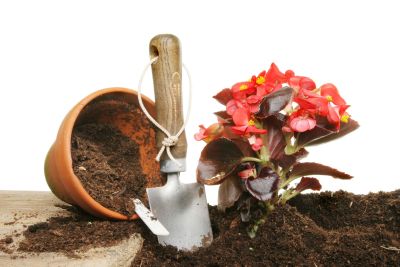Moving a begonia to a bigger pot isn’t always an easy decision, since begonias like to be somewhat root bound. Repotting begonias at some point is necessary to boost soil nutrients and aerate the soil, making begonia transplants healthier.
When to Repot a Begonia
Since begonias like to be root bound, wait to repot until the container is filled with roots. This will be clearly obvious if you gently remove the plant from its pot. If there is still loose soil, allow the begonia to continue growing. When the plant’s roots hold all of the soil, it’s time for a transplant. A begonia transplant may not always need a larger container. Sometimes a begonia may wither and fall over. This means the roots have begun to decay, and there is too much soil providing a surplus of nutrients (and water), more than the plant needs. In this case, you won’t be moving the begonia to a bigger pot, but rather a smaller one. Now that you know when to repot begonias, it’s time to learn how to repot a begonia.
How to Repot a Begonia
When moving begonia to a bigger pot, select a slightly larger pot for the transplant. Slightly means to choose a pot that is an inch (2.5 cm.) larger than its previous pot. It is better to gradually increase the size of the pot as the plant grows, rather than plunking it into a huge container, which can lead to root rot.
Before repotting at all, make sure the plant has a solid root structure. Choose a pot with adequate drainage holes.
Use a soilless planting medium that is equal parts peat moss, vermiculite, and perlite. Amend the medium with a couple of tablespoons of ground limestone to help control humidity. Mix together well and moisten with water.
Gently remove the begonia from its container and immediately transplant it into the new medium. Water the begonia transplant and acclimate it in an area out of direct sun.
